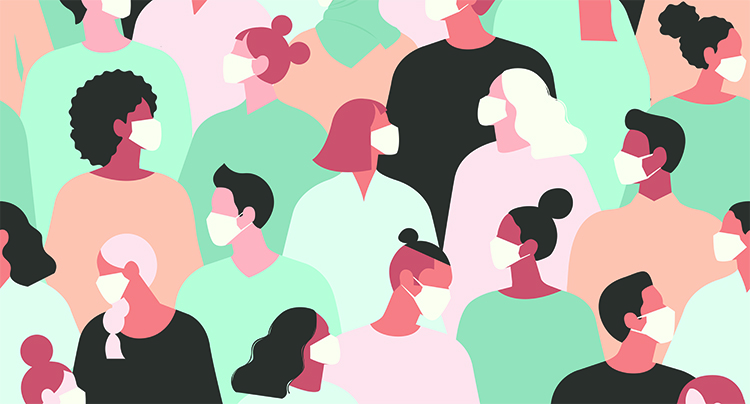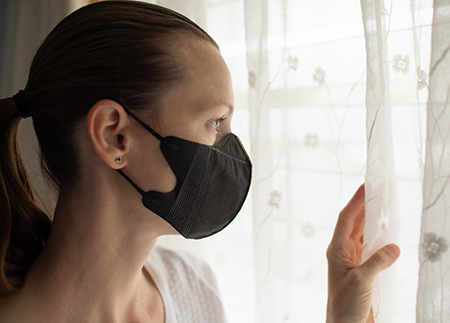Health + Medicine
Feature
Coping With Uncertainty As We Emerge From Lockdown
New York City-based psychotherapist Sherry Amatenstein was diagnosed with breast cancer in mid-February. When the first cases of Covid-19 in the city were reported a few weeks later, she raced to set her surgery date for late March to remove the tumor and an infiltrated lymph node, worried that hospitals would cancel such procedures due to the pandemic.
In her initial consultation, Amatenstein was told she would only need surgery and radiation. But further testing indicated that she would require chemotherapy after the surgery and before the radiation treatment.

It was a lot to cope with, said Amatenstein, author of three books about relationships and editor of the anthology How Does That Make You Feel?: True Confessions from Both Sides of the Therapy Couch, all the more so because the world outside seemed to be falling apart around her. “I washed my hair, and asked myself, ‘Why am I doing this, when I’ll be losing it?’ And I cried.”
Today, as the metropolitan New York area emerges from lockdown, she has recovered from surgery and, more than halfway through her eight chemotherapy treatments, she has indeed lost her hair. She still has a lot to endure: She must be tested for Covid-19 before each chemo session and figure out how to interact with others now that more people are moving about while she is newly immunocompromised. What her life and career will be like post-treatment also remain unclear. She looks for emotional support from her partner as well as help and information from a social worker at Mount Sinai Hospital in New York, where she is getting treatment.
Being a therapist doesn’t make coping easier, said Amatenstein. “I have a little placard in my office that says, ‘Take my advice, I don’t use it.’ ”
Fear and uncertainty are common emotions as people emerge into a world forever changed by enormous losses from Covid-19—from the deaths of loved ones to the loss of financial security. The recent protests across the United States sparked by the death of a black man under the knee of a police officer in Minneapolis have contributed further to the feeling of a society in upheaval.
No one knows what it will feel like to navigate the next few weeks and months—much less plan for the coming year.
“Everybody’s life has been upended,” said Lori Gottlieb, a psychologist based in Hollywood, Calif., whose recently published best-selling book, Maybe You Should Talk to Someone: A Therapist, HER Therapist, and Our Lives Revealed, is being made into a television series.
It is the uncertainty that makes mental stability challenging, experts said, as they described what to expect and provided a few suggestions for weathering post-lockdown anxiety.
From mental health problems to relationship issues, “we are seeing that a lot of challenges people dealt with during the pandemic worsen now,” said Shiri Ben-Naim, director of rehabilitation psychology at the Hadassah Medical Organization in Jerusalem. Ben-Naim spoke to Hadassah Magazine just after Israel allowed people to return to work, synagogues and schools—and then, experiencing an uptick in infections, reinstated some restrictions.
“During hard times, most people can gather their strength and deal with an acute situation,” said Ben-Naim. With the stay-at-home mandates, “you knew if you kept yourself very clean and isolated, you were fairly safe.”
However, “coming out of it is not normalized. There are no specific instructions” for how to proceed with life, she said. “When our clinic at Hadassah began seeing patients face-to-face again, many preferred keeping appointments to Zoom, some because of fear of getting infected and others because staying home is more comfortable.”
Ben-Naim’s advice for her patients at this time? Flexibility. “Reduce the amount of uncertainty, even while accepting when you can’t do that,” she said. “Keep a daily routine, a schedule and plan ahead when possible. But, keeping all plans flexible and preparing alternatives is a way of not being too stressed when reality changes. If you decided to go camping on summer vacation, make alternative plans at home for the same dates in case new Covid-19 instructions won’t allow camping.”

As people emerge from their homes, they should anticipate a wide range of reactions, said Rabbi Simkha Weintraub, rabbinic director of the National Center for Jewish Healing at New York’s Jewish Board. Weintraub, also a licensed clinical social worker, has been running support groups by Zoom, including one series titled “Caring for Your Spirit in a Time of Crisis.”
For some, he said, “initially there will be immobilization and rage,” the results of being deprived of human contact. “People who have been unable to go through the Jewish rituals of mourning loved ones with a funeral or shiva, who had to postpone bar or bat mitzvahs, may have a deferred reaction” of anger or grief at being unable to share those life-cycle events.
These reactions may be inchoate, but they are legitimate and real, he said. Weintraub suggests writing down what you are going through “so you can name it and contain it. Share it and not forget about it.”
Reaching out to loved ones, friends and therapists is also crucial. “People will need a lot of reassurance,” he added, “because they will feel emotionally unsteady.”
The emotional recovery period may be even longer for those who worked to keep feelings of physical or mental fragility at bay during the crisis, he said. That’s something he relates to personally. Weintraub has type 1 diabetes, Parkinson’s disease and myasthenia gravis, a neuromuscular disease. “I feel really vulnerable,” he said.
In addition, for some, “marital and familial stressors have gone from normal tensions to domestic violence,” said Weintraub, and those stresses may continue. The closure of businesses has put strains on everybody, he noted: “The loss of income and those tensions are leaving a difficult legacy.”
Expect a large increase in suicidal ideation, planning and attempts countrywide as we emerge from the lockdown, said Gabby Spatt, executive director of The Blue Dove Foundation. The Atlanta-based initiative provides mental health resources and toolkits to Jewish organizations and has recently seen a large uptick in calls asking for help. “There’s a lot that is going to come up, and people will need more support than ever,” she said.
The level of support needed may depend on your age and stage of life. While the pandemic has been extremely stressful for most of us, “the younger you are, the larger a percentage of your life this has been taking up,” said Gottlieb, who writes The Atlantic’s “Dear Therapist” weekly columns. Many young adults may be mourning “the loss of a future they had imagined, like the job they had lined up out of college that disappeared.”
Gottlieb noted that some younger patients wonder if they should delay trying to get pregnant, asking: “ ‘Do I want to be in a doctor’s office a lot now or wait a year?’ A lot of people are putting things on hold for the next year.”
This may be the first time some young adults are facing an unclear future, she added, suggesting that it is “a really good lesson in tolerating uncertainty.”
It’s a lesson that Amatenstein had no choice but to accept. She had had a full slate planned for 2020: finish a book proposal, give a Ted talk, grow her private practice, travel. All of it was upended by the breast cancer diagnosis and the pandemic. Now, she said, she has spent some time writing, but is focusing on “appreciating who and what I have, listening to my body and resting when I need it.”
When anxiety arises, Amatenstein focuses on tried-and-true relaxation techniques like deep breathing and meditation. She also recommends setting boundaries. “Don’t talk to people who trigger you with their negativity and fear,” she said. And limit social media and check the news at most twice a day.
For some people, the lockdown provided an enjoyable, welcome liberation from societal pressure.
“Some of my patients found sheltering in place to be a safe haven they’ve never experienced before,” said Janie Riley, a psychotherapist based in Berkeley, Calif. “They don’t like a high stress, high productivity environment, which was the norm, where people are expected to go from work to a workout and then meet friends for dinner. They now realize how much stress they’ve been carrying.” The challenge for them will be to shape their lives so they don’t feel overwhelmed as things shift to a new normal.
“Who and what are important to me, what do I want to prioritize with my emotional real estate?” Gottlieb recommends that each person ask him or herself. “Now is a good time to say, ‘I’m not missing that part of that life, but I am missing this part. I’m going to prioritize what I value more.’ ”
She plans to take her own advice. “I really enjoy not having to commute to work,” she said. “I really enjoy not rushing to every extracurricular activity and being around my son more. These are the parts of my life that make me feel human. Now I know as we emerge, I need to make a concerted effort to keep them in my life. I want to live more intentionally.”
Gottlieb, who with her 14-year-old son, Zach, is a member of Temple Isaiah in Los Angeles, experienced the power of connection and community during lockdown. After her father died on March 16 of non-coronavirus-related heart failure, Gottlieb missed having a typical shiva, “with people in and out of the house, hugging us and just being present.”
The synagogue community came through for her, with members calling to check on her and setting up streaming Shabbat services on Facebook so Gottlieb could recite Kaddish.
“We felt incredibly loved,” she said. The pandemic, she added, has caused “a re-centering of the importance of community. People are learning that we need to really strengthen our psychological immune systems. It’s important to share with other people so we don’t feel so isolated.”
Indeed, according to Weintraub, for some the pandemic has been a time of “spiritual growth. We gained something during these terrible times. We gained the strength and ability to look inward and reprioritize,” he said. “Let’s not lose those gifts.”
Reaching Out for Help
The Blue Dove Foundation shares Jewish mental health resources and recommendations for people throughout the country.
The National Domestic Violence Hotline (800-799-7233) has advocates available 24/7 to talk by phone or online chat. Those who cannot speak safely can text LOVEIS to 866-331-9474.
The National Suicide Prevention Lifeline (800-273-8255) provides free 24/7 confidential support by phone or online chat.
Debra Nussbaum Cohen is a journalist and essayist as well as Jewish Insider’s philanthropy correspondent. She lives in New York City.










 Facebook
Facebook Instagram
Instagram Twitter
Twitter
Leave a Reply